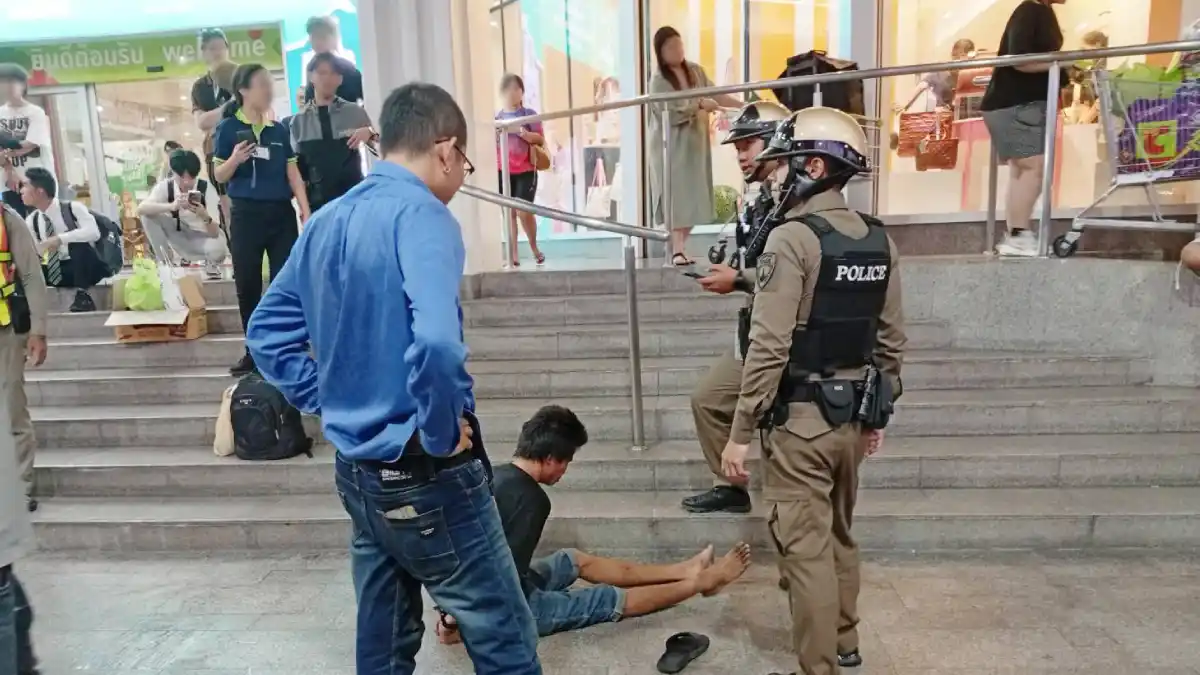In a shocking incident that has rattled Thailand’s tourism industry, and sheds further darkness over Thailand as no longer safe to travel, two Malaysian visitors were brutally assaulted in Bangkok’s Ratchadamri area on the night of August 7, 2025. The attack, carried out by a Thai national reportedly suffering from mental distress and hunger, involved dousing the victims with flammable liquid and setting them alight. As the victims fight for recovery in hospital, the incident has sparked urgent calls for enhanced safety measures and better communication from Thai authorities to restore confidence in the country’s beleaguered tourism sector.
A Devastating Attack Shakes Confidence
The assault on the Malaysian tourists—a male and a female—has sent shockwaves through Thailand’s tourism community. The male victim sustained burns to 69% of his body and remains unconscious, while the female suffered burns to 36% of her body but is conscious and able to communicate through writing. Medical reports indicate both are in stable condition, with gradual improvement, though the male’s injuries are more severe. Doctors estimate a hospital stay of about one month for the male and two to three weeks for the female. Relatives have expressed a desire to transfer the victims to Malaysia for further treatment, but medical advice has delayed such plans for now.
Natthriya Thaweevong, permanent secretary of the Ministry of Tourism and Sports, conveyed the Thai government’s deep condolences to the victims and their families. She emphasized Malaysia’s importance as one of Thailand’s top source markets for international tourists and assured full medical care and assistance until the victims can be safely repatriated. “This was a deeply saddening incident for both Thais and Malaysians” she stated on August 8, 2025.
The government has outlined a compensation scheme for foreign tourists affected by such incidents. Medical expenses will be reimbursed up to 500,000 Thai Baht (~US$15,625) based on receipts, with insurance payouts deducted. An additional 50,000 Thai Baht (~US$1,563) will be provided for emotional distress, capping total assistance at 550,000 Thai Baht (~US$17,188). Further support is under review, and the ministry is coordinating with the Tourist Police to assist the victims’ relatives with transport and other needs. However if Thailand wants to be viewed as fair and in a positive light, the government needs to intervene to offer the victims something considerably more substantial.
Industry Leaders Demand Action
The incident has intensified scrutiny of Thailand’s safety image, particularly among ASEAN countries where security is a top concern for travelers. Sisdivachr Cheewarattanaporn, honorary president and senior advisor to the Association of Thai Travel Agents (ATTA), described the attack as “serious and deeply disturbing.” He warned that it directly undermines tourists’ perceptions of Thailand and damages the country’s reputation in the international community. The risk of video footage or news spreading widely could further erode confidence, even though the incident occurred outside the peak travel season.
Sisdivachr urged the Thai government to prioritize tangible safety infrastructure for tourists and to communicate these measures effectively through foreign-language channels. “We have repeatedly talked about safety measures, but the problem lies in weak communication. We must deliver messages in multiple languages to foreign media, embassies, and the platforms that international audiences use” he said on August 9, 2025. He highlighted the need for proactive engagement from agencies like the Tourism Authority of Thailand (TAT), the Ministry of Tourism and Sports, and the Tourist Police, emphasizing close collaboration to reassure travelers and foreign governments.
The swift arrest of the suspect and the Tourism Ministry’s public updates on the situation were seen as positive initial steps. However, Sisdivachr stressed that sustained, clear communication is essential to demonstrate the seriousness with which Thailand addresses crimes against tourists. Beyond this incident, authorities are also working to determine the attacker’s true motive to improve risk assessments and strengthen protective measures for visitors.
Just over the weekend, a tourist in Phuket, was stabbed in the stomach, and required hospitalization after an argument broke out over the price of fruit. Phuket’s reputation has suffered so much that Chinese tourists now prefer Vietnam and Malaysia as a safer alternative.
Broader Challenges Facing Thai Tourism
The assault comes at a time when Thailand’s tourism industry is grappling with multiple challenges. Sisdivachr pointed to external economic factors, such as the recent appreciation of the Thai Baht to 32 per US dollar (~US$0.031 per Baht), which could influence travelers’ decisions to visit. While the impact of the stronger currency is not yet severe, as the exchange rate remains competitive, there is concern among operators about future cost pressures. Many tourism businesses are still recovering from past economic downturns, and Sisdivachr expressed hope that the Bank of Thailand, under its new governor from the private sector, would implement policies to lower interest rates. “We have raised this issue many times without any real response. This time, we hope to see concrete action” he noted.
Another pressing issue is the need for fresh attractions to appeal to repeat visitors. Sisdivachr observed that competing destinations like Vietnam are drawing travelers with new tourist spots and convenient transport links, while Thai tourists are increasingly visiting China for its well-connected, developed attractions. He argued that Thailand must ensure its secondary destinations are accessible, safe, and rich in compelling narratives. Thematic routes spanning multiple provinces, supported by investments in roads, public transport, and intercity connections, could provide attractive new options for travelers. Collaboration between the TAT and local administrative organizations is critical to achieving this vision.
A Test of Thailand’s Tourism Resilience
Thailand’s tourism sector, a cornerstone of the national economy, has long been a draw for millions of international visitors seeking its vibrant culture, stunning landscapes, and warm hospitality. However, incidents like the assault on the Malaysian tourists underscore the fragility of this industry when safety concerns arise. The country welcomed over 39 million tourists in 2019 before the global pandemic disrupted travel, and while numbers have been rebounding, maintaining a positive safety image remains paramount to sustaining this recovery.
The government’s response to the Ratchadamri incident will serve as a litmus test for its ability to manage crises and restore trust. Beyond immediate compensation and medical support for the victims, the broader challenge lies in addressing systemic issues—ranging from safety infrastructure to economic pressures like currency fluctuations—that could deter future visitors. The call for better communication in multiple languages reflects a recognition that Thailand must not only act decisively but also ensure its efforts are visible and understood by a global audience.
Regional Implications and Future Outlook
The assault also carries implications for Thailand’s standing within ASEAN, a region where intra-regional tourism is a significant economic driver. Malaysia, as a key source market, has historically sent large numbers of visitors to Thailand, drawn by proximity and cultural ties. Damage to this relationship could have ripple effects, prompting other ASEAN nations to reassess the safety of their citizens traveling to Thailand. The incident serves as a stark reminder of the interconnectedness of regional tourism and the shared responsibility to uphold security standards.
Looking ahead, the Thai government faces the dual task of addressing immediate safety concerns while tackling longer-term structural challenges in the tourism sector. Investments in infrastructure, innovative attractions, and economic policies that support businesses could help bolster the industry’s resilience. However, the success of these efforts will hinge on transparent, proactive communication that reassures travelers of Thailand’s commitment to their safety.
As the victims of the August 7 assault continue their recovery, the incident looms as a critical moment for Thailand’s tourism future. Whether the country can turn this crisis into an opportunity to strengthen its safety framework and global reputation remains an open question, one that industry stakeholders and international observers will be watching closely.















